-
 Bitcoin
Bitcoin $82,373.9697
-3.36% -
 Ethereum
Ethereum $1,851.6745
-2.19% -
 Tether USDt
Tether USDt $0.9995
-0.01% -
 XRP
XRP $2.1068
-5.67% -
 BNB
BNB $604.3688
-4.21% -
 Solana
Solana $125.7138
-4.63% -
 USDC
USDC $1.0000
0.01% -
 Dogecoin
Dogecoin $0.1713
-5.80% -
 Cardano
Cardano $0.6723
-4.55% -
 TRON
TRON $0.2343
1.95% -
 Toncoin
Toncoin $3.6885
-8.69% -
 Chainlink
Chainlink $13.7038
-4.56% -
 UNUS SED LEO
UNUS SED LEO $9.5887
-1.08% -
 Avalanche
Avalanche $20.0178
-2.55% -
 Stellar
Stellar $0.2684
-2.91% -
 Shiba Inu
Shiba Inu $0.0...01276
-4.74% -
 Sui
Sui $2.3137
-9.11% -
 Hedera
Hedera $0.1708
-7.54% -
 Litecoin
Litecoin $86.3372
-2.01% -
 Polkadot
Polkadot $4.0851
-4.64% -
 MANTRA
MANTRA $6.3082
-1.10% -
 Bitcoin Cash
Bitcoin Cash $304.0264
-2.74% -
 Bitget Token
Bitget Token $4.5892
-3.43% -
 Pi
Pi $0.8035
-3.52% -
 Dai
Dai $0.9999
-0.01% -
 Ethena USDe
Ethena USDe $0.9992
0.03% -
 Hyperliquid
Hyperliquid $12.6865
-8.10% -
 Monero
Monero $215.4800
-2.52% -
 Uniswap
Uniswap $6.0913
-2.75% -
 Aptos
Aptos $5.3753
-2.22%
Why is Bitcoin address not completely anonymous?
Bitcoin offers pseudononymity, not anonymity; transactions can be linked to identities through exchanges, IP addresses, and analysis, compromising user privacy.
Mar 26, 2025 at 07:29 pm
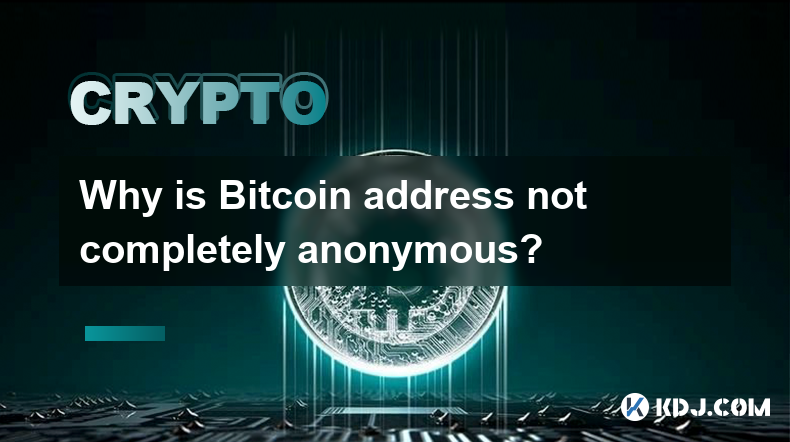
Bitcoin, while offering a degree of pseudononymity, doesn't guarantee complete anonymity. Understanding this distinction is crucial for navigating the cryptocurrency landscape safely and responsibly. This article delves into the reasons why Bitcoin addresses, while not directly linked to real-world identities, are not truly anonymous.
The Pseudonymous Nature of Bitcoin
Bitcoin transactions utilize addresses, which are essentially long strings of alphanumeric characters. These addresses act as public keys, allowing others to send Bitcoin to a specific recipient. Crucially, these addresses are not directly tied to your personal information like your name or location. This is what gives Bitcoin its pseudonymous nature. However, this pseudononymity is not absolute. Various factors can compromise the privacy a user might expect.
On-Chain Data and Transaction Linking
Each Bitcoin transaction is recorded on the public blockchain. This means that anyone can view the transaction history associated with a specific address, including the amounts sent and received, and the addresses involved in the transaction. While this doesn't reveal your identity directly, repeated use of the same address or linking multiple addresses to a single entity can significantly reduce your anonymity.
The Role of Exchanges and KYC/AML Regulations
Most cryptocurrency exchanges require users to undergo Know Your Customer (KYC) and Anti-Money Laundering (AML) procedures. This means providing personal information like your name, address, and identification documents. If you deposit or withdraw Bitcoin from an exchange using a specific address, that address can be indirectly linked to your real-world identity through the exchange's records. This is a major point of vulnerability for maintaining anonymity.
IP Addresses and Transaction Metadata
Every Bitcoin transaction is associated with metadata, including the IP address used to broadcast the transaction. While IP addresses are not always directly tied to a specific individual, they can provide clues about your location and potentially your identity, especially if combined with other data points. This information, while often masked by VPNs or other privacy tools, can be compromised if those tools are insufficient or improperly used.
Clustering and Analysis Techniques
Advanced analytical techniques can be used to cluster Bitcoin addresses and link them to a single entity. This is often achieved by analyzing transaction patterns, amounts, and timings, alongside public information from other sources. Law enforcement and blockchain analytics firms employ these sophisticated methods to identify individuals behind specific Bitcoin addresses.
Mixing Services and Privacy Coins
While not a perfect solution, mixing services and privacy coins offer some level of enhanced privacy. Mixing services shuffle your Bitcoin with others, making it harder to trace the origin of the funds. Privacy coins, such as Monero, employ advanced cryptographic techniques to obscure transaction details, making it significantly more challenging to link addresses to identities. However, even these methods are not foolproof and are subject to ongoing development and analysis by security researchers.
Best Practices for Enhanced Privacy
Use a new address for each transaction: This significantly reduces the ability to link transactions to a single entity.
Utilize a hardware wallet: Hardware wallets offer a higher level of security and privacy compared to software wallets.
Employ a VPN: A VPN can mask your IP address, adding an extra layer of privacy to your transactions.
Consider using a mixing service: Mixing services can help obscure the origin of your Bitcoin.
Be mindful of your online activities: Avoid leaving traces that could link your online activities to your Bitcoin transactions.
Frequently Asked Questions
Q: Can Bitcoin truly be anonymous?
A: No, Bitcoin is pseudonymous, not anonymous. While your identity isn't directly attached to your Bitcoin address, various techniques can be used to link transactions and addresses to individuals.
Q: How can I improve the privacy of my Bitcoin transactions?
A: Using a new address for each transaction, employing a VPN, using a hardware wallet, and considering mixing services can improve your privacy. However, complete anonymity is not guaranteed.
Q: What are the risks of using Bitcoin without prioritizing privacy?
A: Your transactions could be linked to your identity, potentially exposing you to legal or financial risks. This could result in unwanted scrutiny from government agencies or malicious actors.
Q: Are privacy coins completely anonymous?
A: While privacy coins offer enhanced privacy compared to Bitcoin, they are not completely anonymous. Ongoing research and development constantly seek to improve both the privacy and security of these cryptocurrencies. The effectiveness of privacy coins depends heavily on their implementation and the sophistication of the analysis techniques used against them.
Q: What is the difference between pseudonymous and anonymous?
A: Pseudonymous means using a false name or identity, while anonymous means remaining completely unidentified. Bitcoin transactions are pseudonymous because the addresses are not directly linked to your real identity, but that identity can be inferred through various methods.
Q: Is it illegal to use Bitcoin for illicit activities?
A: The use of Bitcoin for illegal activities is illegal. While Bitcoin's pseudonymous nature might make it appealing to those seeking to conceal illicit transactions, law enforcement agencies actively monitor the blockchain and employ sophisticated analytical tools to track and identify individuals involved in such activities. The legality of Bitcoin transactions depends entirely on the legality of the underlying activity.
Disclaimer:info@kdj.com
The information provided is not trading advice. kdj.com does not assume any responsibility for any investments made based on the information provided in this article. Cryptocurrencies are highly volatile and it is highly recommended that you invest with caution after thorough research!
If you believe that the content used on this website infringes your copyright, please contact us immediately (info@kdj.com) and we will delete it promptly.
- Bitcoin and crypto prices have dropped back as inflation fears and U.S. president Donald Trump’s tariff threats
- 2025-03-29 20:50:12
- XYZVerse ($XYZ) Project Merges the Worlds of Sports and Crypto, Attracting Significant Investor Interest
- 2025-03-29 20:50:12
- We're Already Looking for the Best Altcoins to Buy After Kip Herriage Pushed for GameStop to Pour $2.5B into Bitcoin
- 2025-03-29 20:45:11
- Bitcoin (BTC) price drops to the $80k range as it continues trading in a downtrend and falls 4%
- 2025-03-29 20:45:11
- Jagruta devi templay
- 2025-03-29 20:40:13
- Mutuum Finance (MUTM) Tokenizes Crypto Lending, Aims to Disrupt the Market
- 2025-03-29 20:40:13
Related knowledge

How to open a Bitcoin spot trading account
Mar 29,2025 at 12:43pm
Choosing the Right ExchangeOpening a Bitcoin spot trading account involves selecting a reputable cryptocurrency exchange. Several factors are crucial here. Consider the exchange's security features – look for two-factor authentication (2FA) and robust security protocols. Examine trading fees, as these can significantly impact your profits. Check the av...
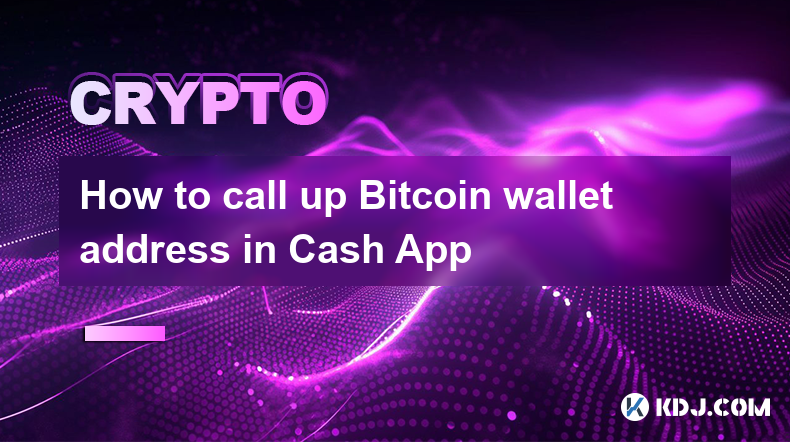
How to call up Bitcoin wallet address in Cash App
Mar 29,2025 at 05:29pm
Cash App, a popular peer-to-peer payment app, allows users to buy, sell, and hold Bitcoin. However, accessing your Bitcoin wallet address directly within the app isn't as straightforward as some other cryptocurrency wallets. This article will guide you through the process and address common concerns. Understanding Bitcoin Addresses in Cash AppUnlike so...
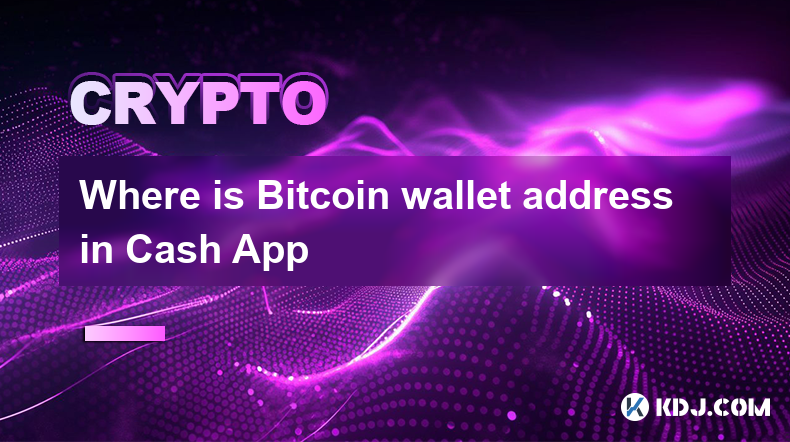
Where is Bitcoin wallet address in Cash App
Mar 29,2025 at 10:56am
? Cash App, a popular mobile payment service, allows users to buy, sell, and hold Bitcoin. However, finding your Bitcoin wallet address isn't as straightforward as with some other crypto wallets. Cash App doesn't display a traditional wallet address in the same way as dedicated Bitcoin wallets like Electrum or Exodus. This is because Cash App manages th...
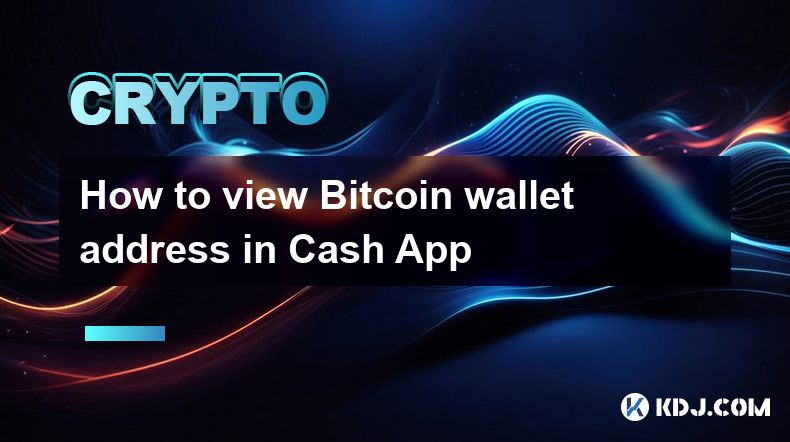
How to view Bitcoin wallet address in Cash App
Mar 29,2025 at 02:35pm
Cash App, a popular peer-to-peer payment app, allows users to buy, sell, and hold Bitcoin. However, accessing your Bitcoin wallet address isn't as straightforward as some other crypto wallets. This article will detail the process and address common concerns. Finding Your Bitcoin Receiving AddressUnlike some dedicated crypto wallets that prominently dis...
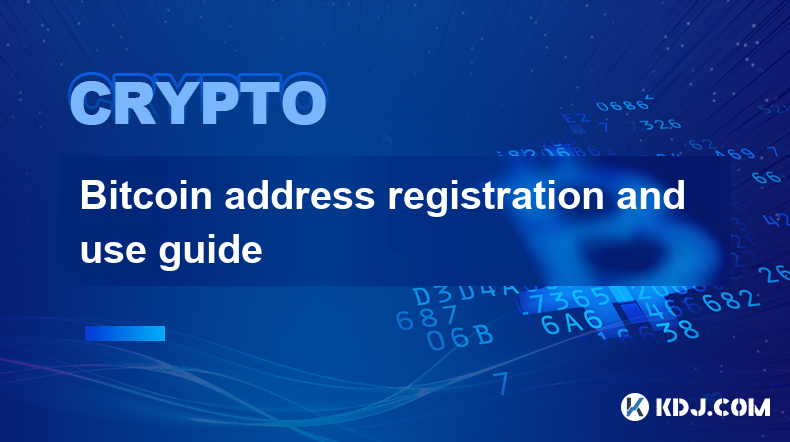
Bitcoin address registration and use guide
Mar 29,2025 at 02:21am
Understanding Bitcoin AddressesA Bitcoin address is essentially your unique identifier on the Bitcoin network. It's a string of alphanumeric characters, similar to an email address, but instead of receiving emails, it receives Bitcoin. Unlike bank accounts, you don't 'register' a Bitcoin address in a centralized system. Instead, it's generated by your ...
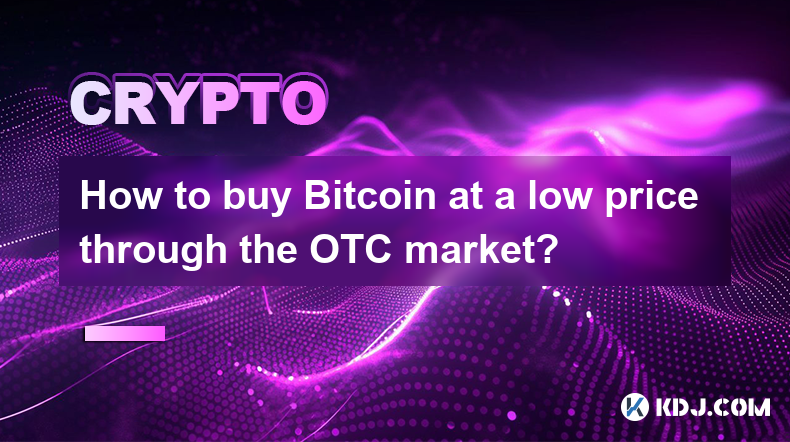
How to buy Bitcoin at a low price through the OTC market?
Mar 27,2025 at 08:56pm
Understanding the OTC Market for BitcoinThe over-the-counter (OTC) market for Bitcoin offers a way to buy and sell large quantities of Bitcoin outside of traditional exchanges. This market is primarily used by institutional investors and high-net-worth individuals due to the significant transaction sizes involved. Unlike public exchanges, OTC trades ar...

How to open a Bitcoin spot trading account
Mar 29,2025 at 12:43pm
Choosing the Right ExchangeOpening a Bitcoin spot trading account involves selecting a reputable cryptocurrency exchange. Several factors are crucial here. Consider the exchange's security features – look for two-factor authentication (2FA) and robust security protocols. Examine trading fees, as these can significantly impact your profits. Check the av...

How to call up Bitcoin wallet address in Cash App
Mar 29,2025 at 05:29pm
Cash App, a popular peer-to-peer payment app, allows users to buy, sell, and hold Bitcoin. However, accessing your Bitcoin wallet address directly within the app isn't as straightforward as some other cryptocurrency wallets. This article will guide you through the process and address common concerns. Understanding Bitcoin Addresses in Cash AppUnlike so...

Where is Bitcoin wallet address in Cash App
Mar 29,2025 at 10:56am
? Cash App, a popular mobile payment service, allows users to buy, sell, and hold Bitcoin. However, finding your Bitcoin wallet address isn't as straightforward as with some other crypto wallets. Cash App doesn't display a traditional wallet address in the same way as dedicated Bitcoin wallets like Electrum or Exodus. This is because Cash App manages th...

How to view Bitcoin wallet address in Cash App
Mar 29,2025 at 02:35pm
Cash App, a popular peer-to-peer payment app, allows users to buy, sell, and hold Bitcoin. However, accessing your Bitcoin wallet address isn't as straightforward as some other crypto wallets. This article will detail the process and address common concerns. Finding Your Bitcoin Receiving AddressUnlike some dedicated crypto wallets that prominently dis...

Bitcoin address registration and use guide
Mar 29,2025 at 02:21am
Understanding Bitcoin AddressesA Bitcoin address is essentially your unique identifier on the Bitcoin network. It's a string of alphanumeric characters, similar to an email address, but instead of receiving emails, it receives Bitcoin. Unlike bank accounts, you don't 'register' a Bitcoin address in a centralized system. Instead, it's generated by your ...

How to buy Bitcoin at a low price through the OTC market?
Mar 27,2025 at 08:56pm
Understanding the OTC Market for BitcoinThe over-the-counter (OTC) market for Bitcoin offers a way to buy and sell large quantities of Bitcoin outside of traditional exchanges. This market is primarily used by institutional investors and high-net-worth individuals due to the significant transaction sizes involved. Unlike public exchanges, OTC trades ar...
See all articles






















































































